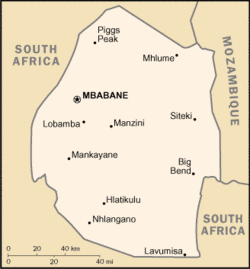Welcome to the Virtual Education Wiki ~ Open Education Wiki
Eswatini: Difference between revisions
(added cat SADC - and tidied pic) |
(→Universities in Swaziland: added info on DL) |
||
| Line 37: | Line 37: | ||
=== Universities in Swaziland === | === Universities in Swaziland === | ||
The University of Swaziland seems to be the only one. | The University of Swaziland seems to be the only one. See http://www.uniswa.sz/ | ||
It has an Institute of Distance Education which has in October 2009 produced Issue 1 of an informative Newsletter - http://www.uniswa.sz/academic/distlearn/newsletter.pdf | |||
The Institute will offer three new programmes: | |||
# Certificate in Portuguese | |||
# Bachelor of Education degree in Primary Education | |||
# Bachelor of Education degree in Secondary Education | |||
These are done in collaboration with the [http://www.uem.mz/ Eduardo Mondlane University] in Maputo (Portuguese programme) - it is the oldest and largest university in Mozambique - and the staff of the University of Swaziland Faculty of Education (degrees in Education) | |||
The Institute has also recently installed Moodle. | |||
=== Polytechnics in Swaziland === | === Polytechnics in Swaziland === | ||
Revision as of 11:56, 5 February 2010
Partners situated in Swaziland
None.
Swaziland in a nutshell
(sourced from http://en.wikipedia.org/wiki/Swaziland)
Swaziland, the Kingdom of Swaziland (Umbuso weSwatini), sometimes called Ngwane, is a landlocked country in Southern Africa, bordered to the north, south, and west by South Africa, and to the east by Mozambique.

The nation, as well as its people, are named after the 19th century king Mswati II.
Its population is 1.18 million.
Its capital is Lobamba (royal capital) and Mbabane (administrative capital and the largest city).
Swaziland's economy is dominated by the service industry, manufacturing and agriculture. Some 75% of the population are employed in subsistence farming, and 60% of the population live on less than US$1.25 per day.
Swaziland's main trading partner is South Africa, and its currency is pegged to the South African rand.
Swaziland's economic growth and societal integrity has been highly endangered by an ongoing HIV epidemic.
Swaziland education policy
Education in Swaziland is neither free nor compulsory. In 1996, the net primary school enrollment rate was 90.8%, with gender parity at the primary level. In 1998, 80.5% of children reached grade five.
Swaziland education system
Higher education
Universities in Swaziland
The University of Swaziland seems to be the only one. See http://www.uniswa.sz/
It has an Institute of Distance Education which has in October 2009 produced Issue 1 of an informative Newsletter - http://www.uniswa.sz/academic/distlearn/newsletter.pdf
The Institute will offer three new programmes:
- Certificate in Portuguese
- Bachelor of Education degree in Primary Education
- Bachelor of Education degree in Secondary Education
These are done in collaboration with the Eduardo Mondlane University in Maputo (Portuguese programme) - it is the oldest and largest university in Mozambique - and the staff of the University of Swaziland Faculty of Education (degrees in Education)
The Institute has also recently installed Moodle.
Polytechnics in Swaziland
Higher education reform
The Bologna Process
Administration and finance
Quality assurance
Swaziland HEIs in the information society
Towards the information society
Information society strategy
Virtual Campuses in HE
Interesting Virtual Campus Initiatives
Interesting Programmes
Re.ViCa Case-study
None.